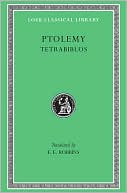

 |

|

The average rating for Tetrabiblos (Loeb Classical Library) based on 2 reviews is 3.5 stars.
Review # 1 was written on 2019-03-18 00:00:00 JEANETTE AVILA JEANETTE AVILAClaudius Ptolemy was one of the most renowned astronomers of the ancient world. When we speak of the Ptolemaic system, we are referring to the geocentric rather than the heliocentric cosmological model. During this period of astronomical study, astronomy and astrology were not really distinct disciplines. That being said, Ptolemy's Almagest might be considered his more astronomical work and the Tetrabiblos would be considered his more astrological one. The only reason that I read this work rather than the Almagest first is that my copy of the Almagest got boxed up during my recent move and is still in storage. My copy of the Tetrabiblos wound up in a box of books that went with me to my current place of residence. The Tetrabiblos is not an uninteresting work, even though I must say that I do not put a lot of stock in astrology. One should keep in mind, however, that it was a branch of philosophical thought during this time. Certainly, Plato did accord to astrology some importance; but, as I said, astronomy and astrology were intimately intertwined for many hundreds (maybe even thousands) of years. The fact that often meglithic sites have some zodiacal sign as their inspiration does suggest that astrology in some form or another was a major influence on ancient societies. It does prevent me from dismissing it totally out of hand. I must reject any fatalistic aspects of astrology, but there may be some value in its function as demarcating periods of cosmic significance. The Greeks held that periods of time were associated with ruling deities and this would almost certainly include their assigned luminary. The bible seems to support this aspect of astrology. To explore this further here would be too much of a digression; suffice it to say that I do not dismiss all aspects of astrology out of hand, only the more subjectively fatalistic ones. Ptolemy's main intent seems to be forecasting human experience and behavior using cosmological indicators. Certain planets and luminaries seem largely to be beneficial (e.g. Jupiter, Venus and the sun), others are almost always malignant (e.g. Mars and Saturn); at least one, Mercury, could be either beneficial or malignant depending on its recourse to various cosmic alliances. Many factors can influence persons and events on earth, i.e. whether a particular luminary is descending or ascending, and whether particular luminaries are found in particular zodiacal signs and whether they are coupled with other luminaries. One usually gets the sense in astrology that the factors are either so broad that almost any application will fit, or so technically specific that seemingly appropriate applications fail to meet the criteria. The book is certainly worthwhile as a window into astrological belief during the Hellenistic era. I wouldn't take the position that much of it is practical, but this was undoubtedly seen as philosophical at the time, so I thought it was important to familiarize myself with it. I should mention there are a lot of typos in this createspace edition. I added an image that shows the schematic for the antikythera mechanism. I felt that it was a fitting addition. |
Review # 2 was written on 2011-06-27 00:00:00 Joseph Jacques Joseph JacquesUsed in my Phd thesis. Clearly a well read and intelligent individual. |
CAN'T FIND WHAT YOU'RE LOOKING FOR? CLICK HERE!!!